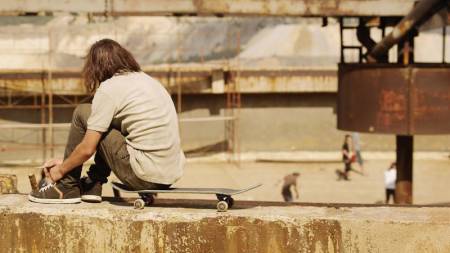-
Nikola Lezaic: Tilva Rosh (2010
Nikola Lezaic: Tilva Rosh (2010)

MARKO TODOROVIC IN TILVA ROSH
Serbian skateboarders enjoy a last summer of youth
The film focuses on a long-haired skateboarder skating down a pebbly hill (he says its name is "Tilva Rosh") and from the subtitles we learn Serbian has equivalents for words like "Nigga," "dude," and "wazzup." Toda and Stefan have just graduated from high school, and are spending the summer shooting Jackass-style videos of each other as they skate the empty former copper mine in their town of Bor (no pun intended) while waiting for one of them to go off to college.
The two guys are Toda/Marko (Marko Todorovic) and Stefan/Steki (Stefan Djordjevic). Steki is going to the University of Belgrade shortly. Toda/Marko isn't, and says he wouldn't even if he had the money. Toda hurts his head doing one of their stunts. Later whenn the boys sing at a shindig the emcee, whom they tease unmercifully, hits Toda again on the head, so he goes to the doctor. But he finds he's no longer covered as a student and must go to the factory to sign up for the bureaucracy to provide him with medical coverage -- a situation that sorely challenges his sense of youthful independence. He has to go to a CV preparation class or he won't get the benefits of the Employment Service.
Meanwhile a girl called Dunja (Dunja Kovacevic)) is back from France on summer holiday, and both boys themselves compete for her attention.
The "dudes" do the things young people do, get drunk, act wild, challenge and harass a new member before admitting him to the skate club. There are many little rites of passage, including self-imposed piercings and the brutal Jackass-style abuse Toda and Steki impose on each other. Later, they all get involved in a demonstration against the scam to privatize the mine.
These boys and their pals and parents and everybody on the scene may speak an odd dialect of Serbian, but the youthful rivalries, the desire to hang onto teenage freedom while the realities of the bigger world are in their faces, are elements of a universal coming of age story, and these two guys have an authentic loosely-slung quality that can't be faked. In fact they were discovered by the director (whose name is usually spelled Nikola Ležaić; the titles is spelled Tilva Roš in Serbian) when he came across their set of Jackass-style stunt videos, which they called Crap, and found them hilarious. Crap was like a dry-run mixtape for Tilva Roš. The circumstances leading up to the film are very much a part of the film and so is the depressed mining area the actors and filmmaker come from. Tilva Roš means "red hill," and Stefan explains in the opening scene that this place where they begin shooting, which was once a big hill, is now only a big empty hole.
Several things distinguish the film: the naturalness of the performances; the specific sense of place; the sense of solidarity and identity that the youths have as a group. This is also one of the best films for showing young people hovering between childhood and adulthood. A well-timed climactic moment comes in the rambling story when the guys are hassling the bald-headed emcee for hitting Toda (against the wishes of Toda, who wants to forget about it) when all of a sudden they wander into a big demonstration of workers, and the skateboarders fall in with the march. It's as if all of a sudden they consent to stop being slackers and turn into citizens. Steki jumps on a police car and is cheered for videotaping the demo from there. But only minutes later the whole posse -- over a dozen of them -- are skating through a big supermarket and trashing the aisles as Steki films that. They seem to be just taking advantage of the protest to act wild.
The risky stunts of Steki and Toda are great acts of camaraderie. Everybody appears to be having an awful lot of fun, and there's a loose, summery style that starts with the long hair and the loose clothes everybody wears. And this includes most of the parents and other adults, who are mostly represented as sympathetic and laid back.
The film is cleanly photographed and sparing in its use of music. Lezaic gets the maximum from his young actors, who are splendidly real as variations on themselves. This stands as an essential contribution to the cinema of twenty-first century youth.
Tilva Rosh has been in many festivals, beginning with Sarajevo (July 2010), where it won the grand prize, and most recently at Rotterdam, Miami and San Francisco. It was screened at the San Francisco International Film Festival for this review.
SFIFF Screenings
Thu, Apr 28 9:00 / Kabuki
Fri, Apr 29 9:15 / Kabuki
Mon, May 2 3:15 / Kabuki
Last edited by Chris Knipp; 05-04-2015 at 11:05 PM.
 Posting Permissions
Posting Permissions
- You may not post new threads
- You may not post replies
- You may not post attachments
- You may not edit your posts
-
Forum Rules





 Reply With Quote
Reply With Quote
Bookmarks